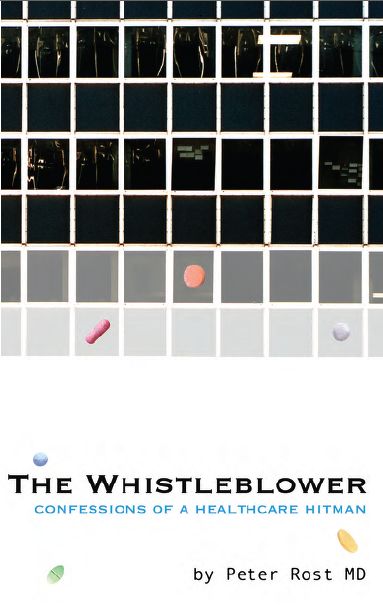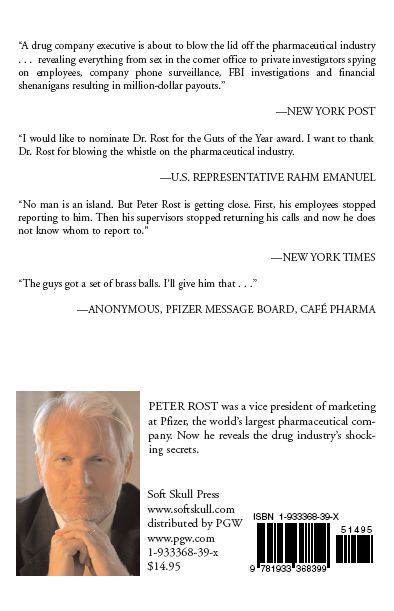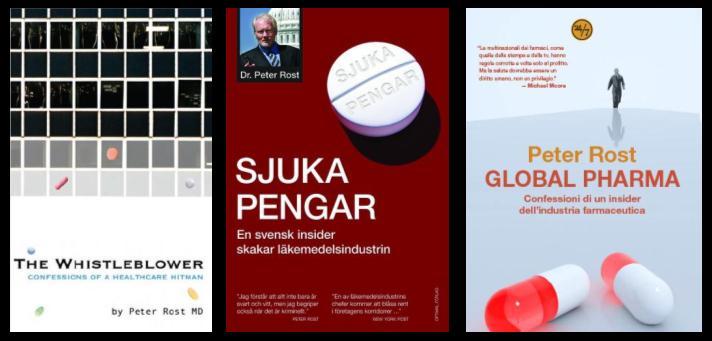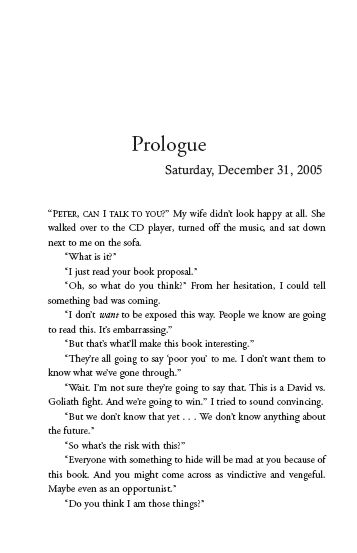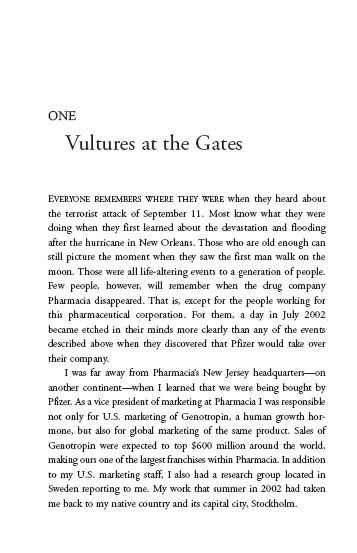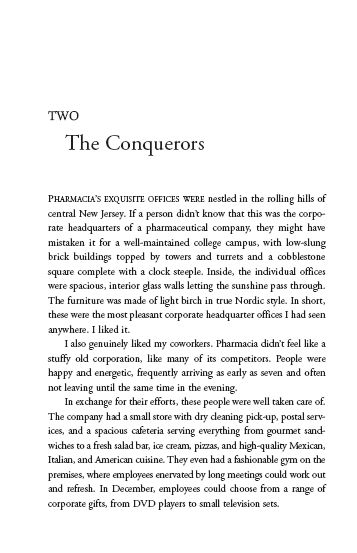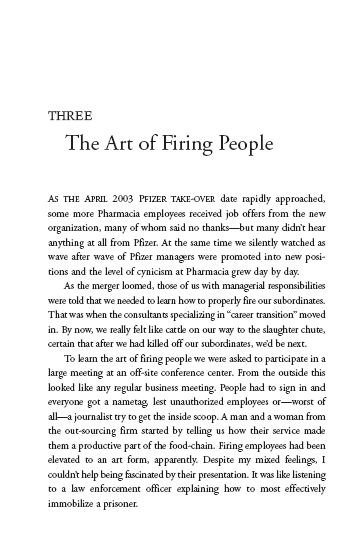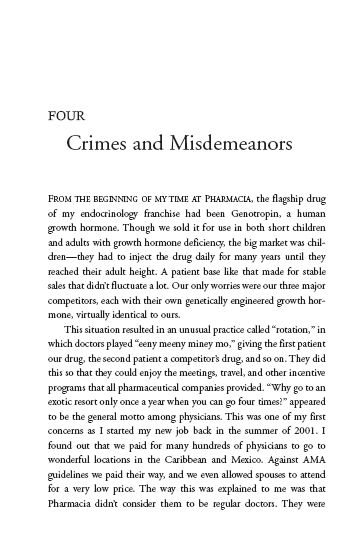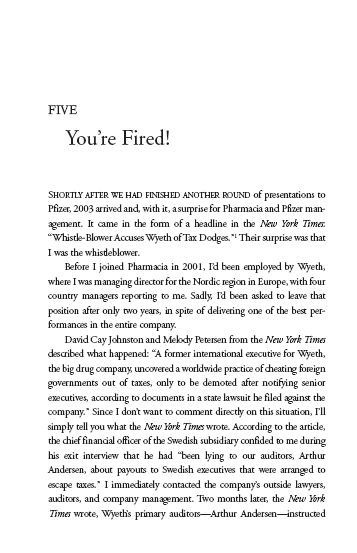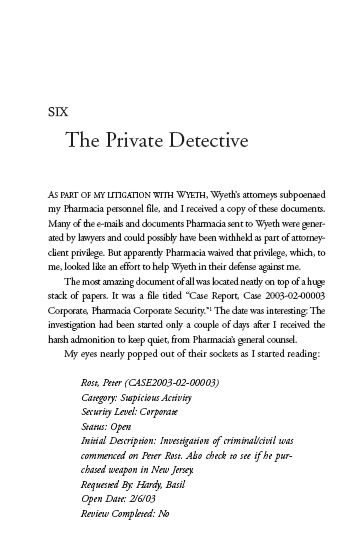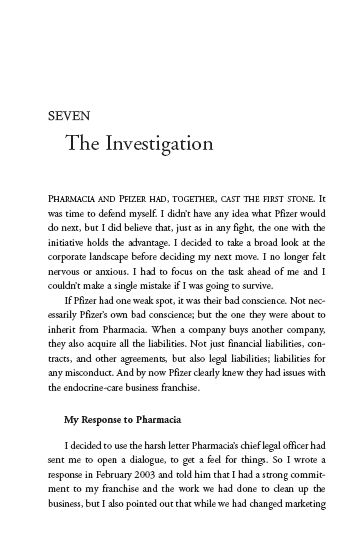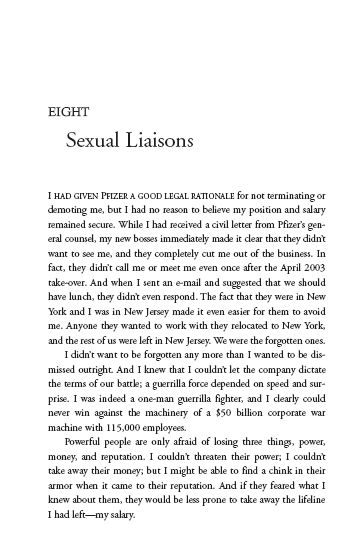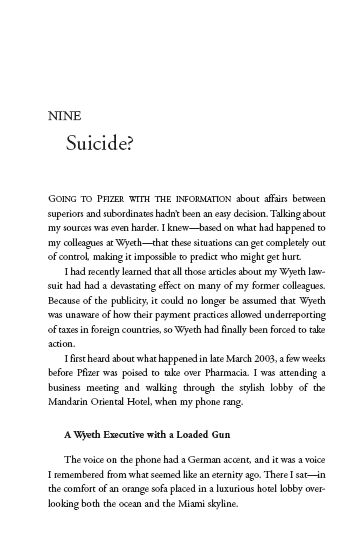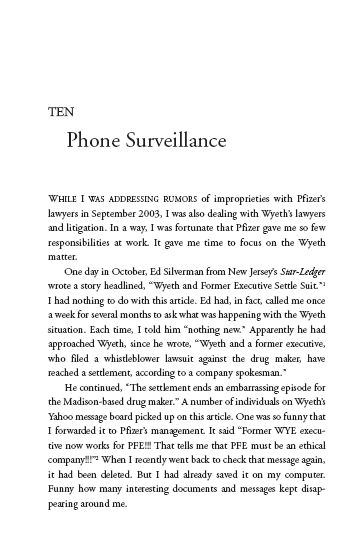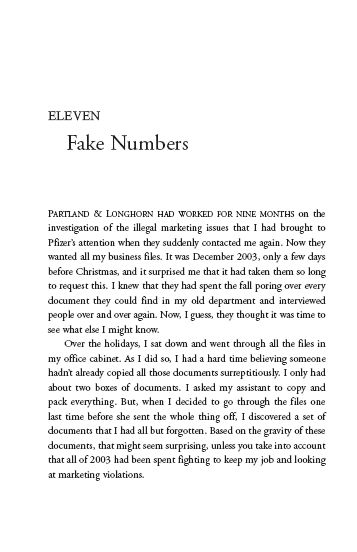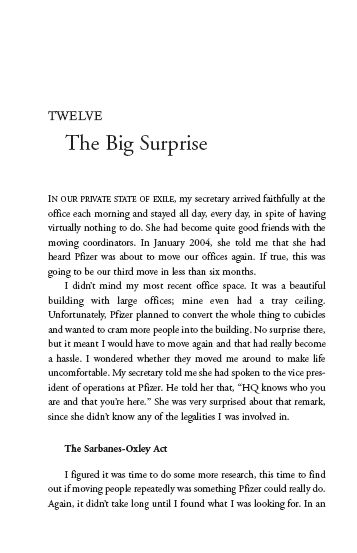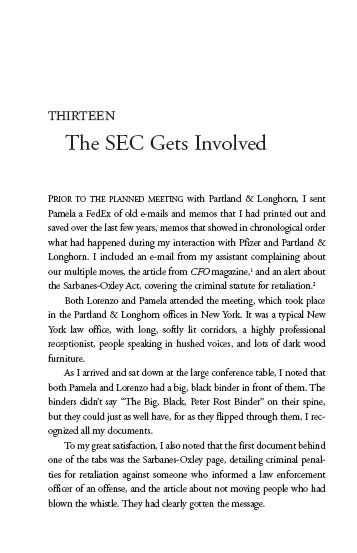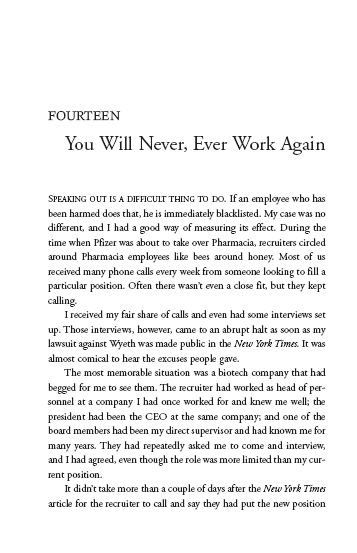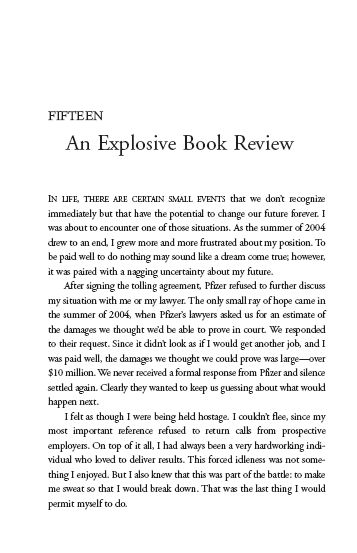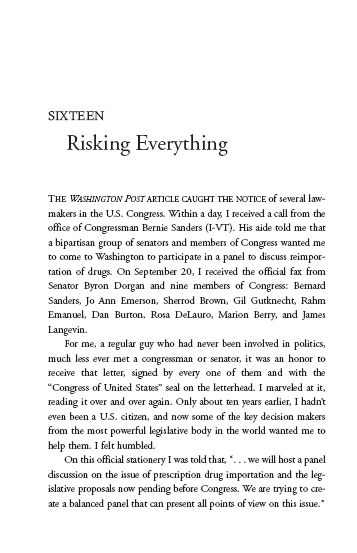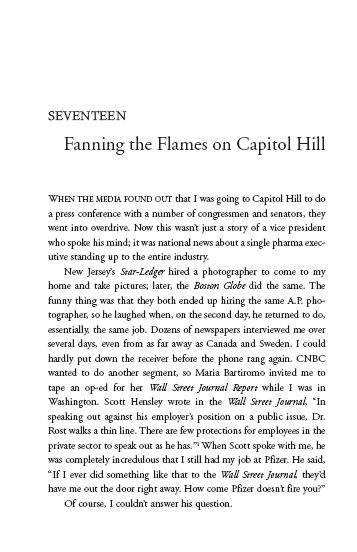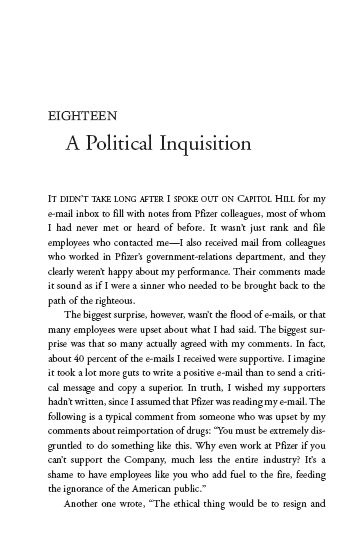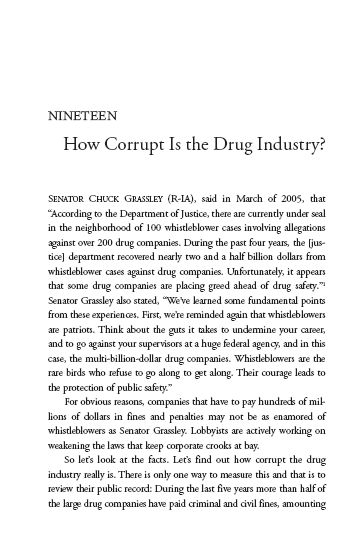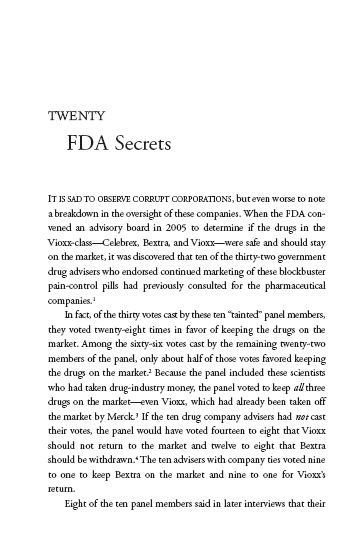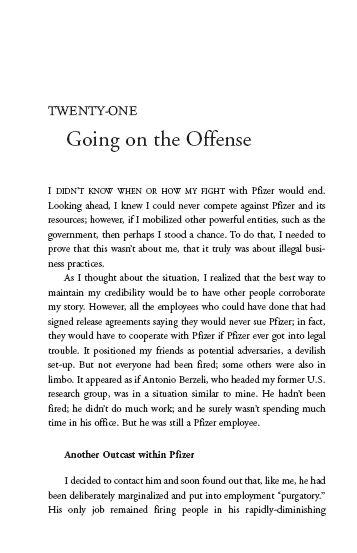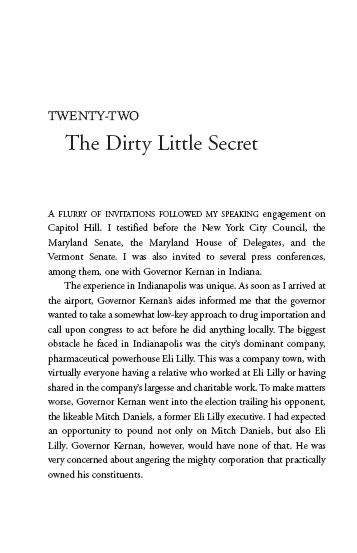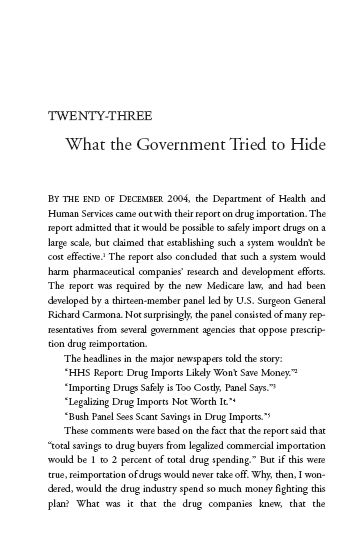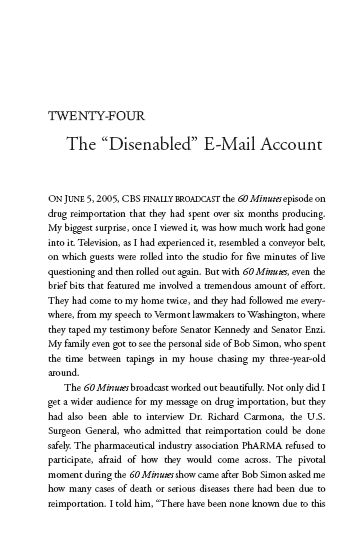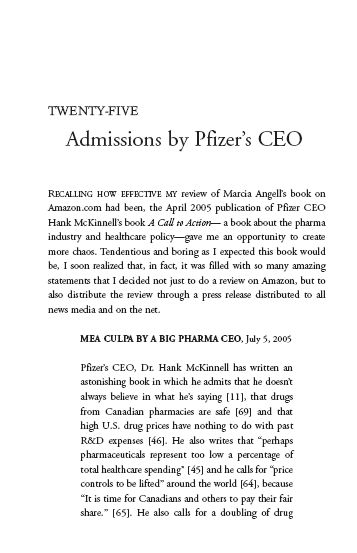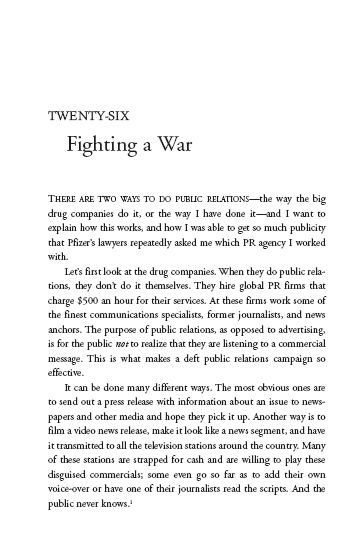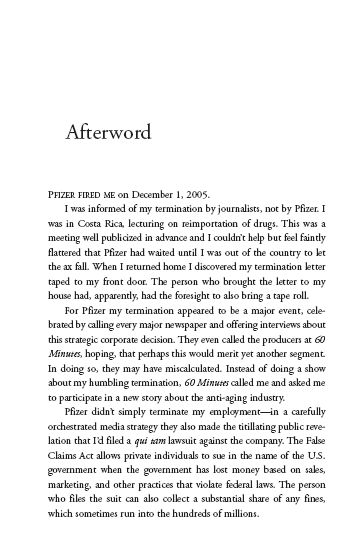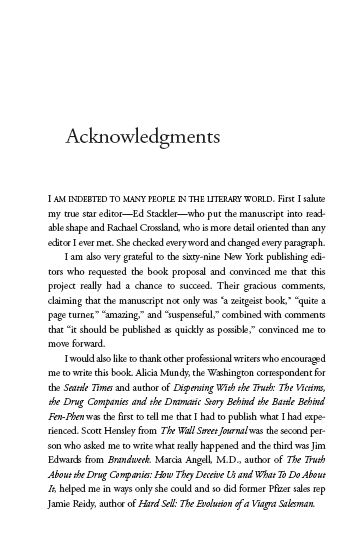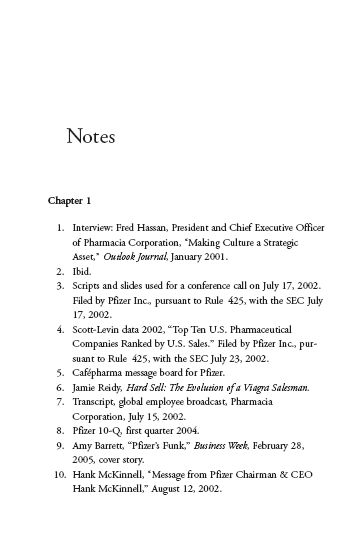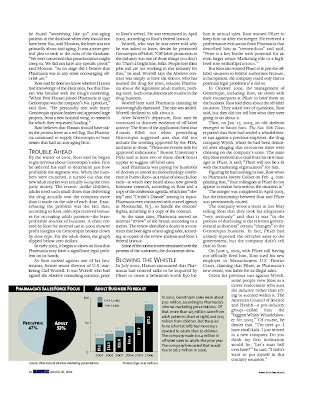THE WHISTLE BLOWER Confessions of a Healthcare Hitman
THE WHISTLEBLOWER is at once an unmasking of how corporations take care of malcontents and a gripping story of one man's fight to maintain his family and his sanity. Starting in 2003, the book details the illegal, even criminal business practices the author witnessed at his corporation, as well as his crusade to legalize the reimportation of drugs.
THE WHISTLEBLOWER AND Dr. ROST - TELEVISION/RADIO/NEWS CLIPS
Leonard Lopate Show, New York Public Radio. Streaming audio here.
60 Minutes, "Insider's Rx For Drug Costs." Streaming video here.
ABC/Safran download here.
Barry Gordon/From left field download here.
CNN:
FOX News:
Dr. Rost on Capitol Hill:
Dr. Rost and Maria Bartiromo:
PHARMACEUTICAL EXECUTIVE. Click on images to read.




PLAYBOY
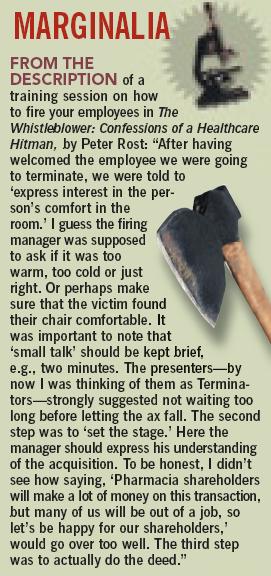
FORTUNE
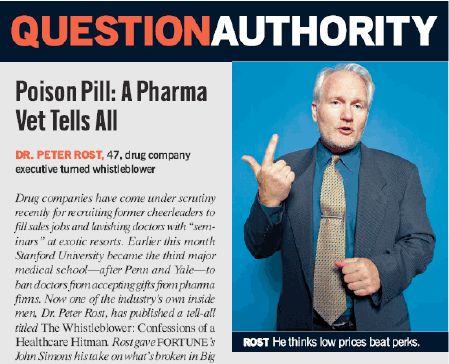
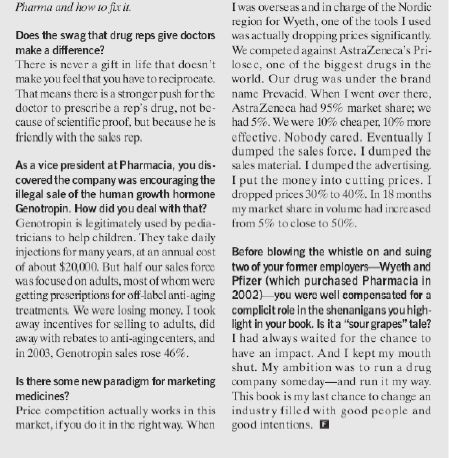
The Whistleblower: Review in Trial Magazine
Review in Trial Magazine, the magazine published by the American Association for Justice (formerly the Association of Trial Lawyers of America).
BooksMay 2007 Volume 43, Issue 5
The Whistleblower: Confessions of a Healthcare Hitman
Peter Rost
Soft Skull Press
http://www.softskull.com/
224 pp., $14.95
Reviewed by Jason Mark
It is not unusual for plaintiff lawyers litigating pharmaceutical cases to uncover business practices that put profits over safety. We read about it in documents we discover and hear about it in testimony we take during depositions. Unfortunately, that focus on sales, not safety, is common in the marketplace controlled by big pharma.
Peter Rost, a physician and former drug company executive, knows about it, too—but at an almost incomprehensible personal and professional sacrifice. The Whistleblower: Confessions of a Healthcare Hitman could not have been easy for Rost to write, never mind publish. In the hope of setting the record straight, he exposed the corrupt power of a pharmaceutical giant and laid a foundation for positive change in the future. But in doing so, he may have ensured the end of an impressive career.
Rost was vice president of marketing at Pharmacia, a rarely talked-about pharmaceutical company that Pfizer took over in April 2003. He was in charge of U.S. and global marketing of Genotropin, a human growth hormone and flagship drug for Pharmacia that was expected to generate global sales in excess of $600 million. Genotropin was intended for use in short children and adults with growth hormone deficiency.
Rost enjoyed life at Pharmacia. His coworkers were happy and energetic, and the atmosphere was positive.
Enter Pfizer. As Rost describes the takeover, Pfizer dehumanized the once-vibrant Pharmacia workplace. Managers were forced to attend “career transition” school—a course on how to fire the masses of Pharmacia employees who would be casualties of the takeover. And managers were forbidden to provide recommendations for employees leaving the company.
Even worse, Rost claims, was Pfizer’s resolve to destroy anyone who stood in its way or who wanted—as Rost did—to tout the cost and health care benefits of importing drugs, and to tell the truth about Pfizer’s decision to illegally promote off-label use of Genotropin as an anti-aging drug. Rost says the company entered into “favorable contracts” with distributors and doctors working in the anti-aging area and paid them kickbacks through “consulting agreements.” Sales reps who did not agree to Genotropin’s off-label promotion were fired or faced other adverse actions.
Rost, for his part, worked with Pharmacia’s legal department to correct many of the illegal marketing practices. He then went on a truth-telling mission, which appears to have been aimed in part at trying to save his job both during and after the takeover. Pfizer, he thought, might not want to fire someone with enough information about illegal marketing activity to be a serious liability to the company.
But Rost’s actions were not all self-serving. In fact, they’re cloaked with unimpeachable credibility because ultimately they address an issue—the industry’s opposition to drug importation—not specific to him, his job at Pfizer, or even Pfizer itself. Rost took on the entire industry, not because he had an ax to grind, but because of his belief in access to health care and the free market system.
The drug industry’s resistance to importation is, as Rost describes, due to the closed market it controls. Companies fear that importing drugs will cut into their bottom lines.
Rost thinks otherwise. He characterizes drug importation as one of the most important health care issues today and describes how 67 million Americans are without insurance for drugs. “The biggest argument against reimportation is safety,” he writes. “What everyone has conveniently forgotten to tell you is that in Europe, reimportation of drugs has been in place for 20 years.” If other countries could do it, and have done it, then why not the United States? As for company profits, Rost describes how lowering prices and making drugs more accessible can actually increase market share and ultimately create profits.
Notwithstanding ongoing pressure from Pfizer to keep quiet, Rost has demonstrated how one person can assert tremendous pressure against a corporate giant. He writes about how media appearances, newspaper articles, communication with various government agencies, and a general investigatory savvy helped him get his messages out and, at the same time, demonstrate to Pfizer that he was not simply going to go quietly into the night.
Ultimately, Rost was fired. He has brought a False Claims Act lawsuit against Pfizer.
He opens his book by noting some interesting statistics about whistleblowers from a study by Donald Soeken of St. Elizabeth’s Hospital in Washington, D.C. After exposing fraud, 90 percent of whistleblowers were fired or demoted, 26 percent had to seek psychiatric or physical care, 17 percent lost their homes, and 8 percent were bankrupted. Still, only 16 percent said they would not blow the whistle again.
It’s difficult to fathom putting your personal and professional life on the line. But that’s exactly what Rost did, and he tells about it in a compelling story of courage and principle.
Jason Mark practices law in Great Neck, New York.
FEATURED REVIEWS
The Progressive Populist
Lone Wolf Takes on the Pharma Pack
By Jake Whitney
Early in Dr. Peter Rost's new book, The Whistleblower: Confessions of a Healthcare Hitman, Rost compares corporate culture to running with a wolf pack. "Everyone helps out and is friendly as long as it benefits the group," he writes, "but each wolf cares only about himself and will do anything to survive."
Rost is talking about the bad guys -- the greedy corporate executives and gutless, backstabbing coworkers who either take part in or turn a blind eye to corporate malfeasance. Rost, as the title indicates, is the good guy, and The Whistleblower recounts his career exposing corporate wrongdoing. But the question that lingers over his 200-page David vs. Goliath story is this: Is Rost, too, a wolf, attracted to whistleblowing by reasons more self-serving than altruistic?
Rost's career as a whistleblower began at the pharmaceutical giant Wyeth, where, as a top executive, he sued the company after blowing the whistle on tax fraud. His book skips this part (for legal reasons) and picks up a few years later, in the summer of 2002, when Rost was a successful vice president at Pharmacia -- a mid-sized, New Jersey-based drug firm. In July of that year, Pfizer, the biggest pharmaceutical company in the world, announced it would acquire Pharmacia, and Rost's book takes us through the acquisition up until his firing, on Dec. 1, 2005.
According to Rost, his termination from Pfizer was the final blow in a prolonged period of retaliation for his whistleblowing, which included shedding light on a string of illegal and/or unethical business practices: illegal marketing of Genotropin, a human growth hormone; wholesaler stuffing (to inflate sales numbers); and sexual liaisons among Pfizer management. But it was Rost's position on drug importation that made him famous.
While still a vice president at Pfizer, Rost infuriated his bosses by appearing before Congress and on 60 Minutes advocating the importation of drugs from Canada as a way to reduce pharmaceutical costs for Americans. This was a direct contradiction of the industry's (and the Bush administration's) line, which declared importation to be unsafe. But Rost, a native Swede, shot holes in the industry's argument by pointing out that drug importation had been taking place safely in Europe for 20 years.
All of this is recounted in fascinating detail in The Whistleblower, much of which reads more like a detective novel than a memoir. This is due in no small part to the fact that, as Rost's responsibilities at Pfizer were slowly removed, he was left with little to do but detective work. His account of what he discovered is alternately hilarious and terrifying.
In the book, Rost recounts how, following his appearance on 60 Minutes, Pfizer retaliates by disabling his corporate email, killing his cell phone and dropping his annual bonus. In response, Rost pens emails to Pfizer's general counsel and IT department demanding an explanation -- and he attaches an electronic tracer to the messages. The emails bounce around the company and then on to three "world-class law firms" and a huge communications company. Within a few days his emails are opened over 100 times, and Rost realizes he may be "outgunned" in his battle with Goliath.
Perhaps Rost's scariest discovery comes after pushing Pfizer management to address Pharmacia's illegal marketing of Genotropin. He uncovers a mysterious document stuck in his personnel file which turns out to be authored by a private investigator, hired by Pfizer, reporting on whether Rost ever purchased a weapon and whether he might be a danger to himself or others. It is around this time, Rost says, "I vowed I would expose the pharmaceutical industry and their methods."
Rost's critics say his whistleblowing has been more about seeking fame and fortune (the latter in the form of book deals and lawsuit settlements) than helping people. In fact, Rost does have an uncanny habit of making headlines by exposing deviousness wherever he goes -- most recently at HuffingtonPost.com, where he was "fired" after unmasking a frequent critic as the Post's very own technology manager.
But criticizing Rost's motives is off base, for two reasons. For one, every time Rost has spoken out, he's lost more than he's gained. By taking on Pfizer and publicly advocating importation, he insured he would never work in the industry again; at Wyeth, he lost what he said was the best job of his life. "I've never had more fun than when I was the managing director of the Nordic region," he said in a recent interview. "Nothing I've done since compares with that."
Second, Rost's book is about more than just himself. Much of the latter half, in fact, has nothing to do with Rost's battle with Pfizer, but is rather a litany of recent drug company corruption, and Rost argues convincingly that the FDA and America's major medical journals have been co-opted by the industry. When he moves on to examine the American economy at large, where he lays out some eye-opening statistics comparing skyrocketing CEO salaries with the static ones of American workers, we realize Rost has reached his destination.
Ultimately, The Whistleblower is an impassioned jeremiad against corporate greed, with Rost our inside man. The book's overriding theme is that the American political system is in danger of degenerating into a plutocracy (or "kleptocracy," as he dubs it) -- if it hasn't already. "The American democracy has been stolen by our new class of robber barons -- the CEOs of our largest corporations," he writes.
These assertions aren't new, but when spoken by a former vice president at the world's largest drug company, they take on added weight. Rost, after all, was reeling in almost a million dollars a year with Pfizer, and conceivably one day could've joined this ruling class. Instead, he chose to break away from the pack, and become a lone wolf. And we're all the better for it.
The British Medical Journal.
BMJ 2007;334:261 (3 February), doi:10.1136/bmj.39108.525810.59
Views & reviews
REVIEW OF THE WEEK
Telling the inside story?
Jeanne Lenzer, freelance medical investigative journalist, Cambridge, MA, USA
jeanne.lenzer@gmail.com
A sacked drug company executive claims to spill the beans on the industry in a new book
Peter Rost, erstwhile drug company executive, self proclaimed whistleblower, and now book author, first became a cause célèbre in August 2004 when he wrote an endorsement of The Truth about the Drug Companies, the book by former New England Journal of Medicine editor Marcia Angell. He posted a commentary on Amazon.com, saying, "I should start with a disclaimer. I'm a vice president within one of the largest drug companies in the world and I have spent close to 20 years marketing drugs. So I guess I'm not supposed to like this book. But the truth is I thought it was fantastic."
Rost's posting was picked up by the media and he became a much sought after guest on television and radio shows. He took up the cause of drug reimportation, a practice that would allow foreign drug companies to sell drugs in the United States. Reimportation, argued Rost, is widely practised in Europe and could drastically reduce drug prices in the US. His position was in sharp contrast with that of his employer, Pfizer, and to virtually all major US drug companies, which vehemently argued that reimportation would allow unsafe drugs to enter the US and would threaten the health and safety of its citizens.
But Rost began to run into trouble long before he became a public advocate of reimportation. In 2001, as the new head of the endocrine care division of Pharmacia, he learnt, according to his account, that the division's flagship drug, Genotropin, a synthetic form of human growth hormone, was being promoted for off-label uses. Off-label promotion of growth hormone is a felony under federal anti-doping laws. Pfizer, which bought out Pharmacia in April 2003, failed to put a stop to the off-label promotions, says Rost.
Rost alleges that it was his complaints about the marketing of Genotropin that led Pfizer executives to fire him. He was first informed in an email message on 3 February 2003 that he was to be sacked, but he managed to hold on to his job for two and a half years, until 30 November 2005, when he was finally let go. Rost filed a qui tam, or whistleblower, lawsuit against both Pharmacia and Pfizer in December 2005. In the suit and the book, Rost claims to describe some of the inventive marketing techniques used by the companies to promote sales of Genotropin to "anti-aging" clinics and for the treatment of short children who did not have growth hormone deficiency.
Rost, who paints himself as a regular guy in his book, is the quintessential marketer. Along with the publication of The Whistleblower, he has a Hollywood agent looking for potential movie deals; he has written a fictional thriller about the drug industry entitled, The Wolfpack; and he is scheduled to be interviewed for Sicko, Michael Moore's documentary movie, on the healthcare industry.
A niggling aspect of The Whistleblower is that Rost repeatedly wastes the reader's time defending his motives for his various actions as he sought to hang on to his job. Some of his actions appear simply indefensible. Rost, who earned over $600000 (£305 000; 460 000) annually (exclusive of benefits, annual bonus awards, and stock options) is hardly a man without warts. When Pfizer asked him to fire a number of his colleagues, Rost fired them—while bemoaning their fates in the book. He is at his worst, perhaps, when he spends an entire chapter on irrelevant speculation about the sexual activities of Pfizer's bosses. Rost makes no bones about why he wants to pursue possible sexual improprieties, even though he has no first hand knowledge of the events. "If they feared what I knew about them," he writes, "they would be less prone to take away the lifeline I had left—my salary."
Rost's book claims to chronicle problems in the way the drug industry manages to circumvent rules prohibiting off-label drug promotions. In addition, Rost's endorsement of reimportation is perhaps one of the most articulate defences made in the US. The Whistleblower may also reach some lay readers who were not moved to pick up any one of a number of more academic books on the drug industry. Finally, his overview of serious violations by nine top drug companies in his chapter" How corrupt is the drug industry?" should make one thing crystal clear: fines simply don't work. They are, as has often been said, simply the price of doing business.
"Working for a corporation," writes Rost, "is like running with a wolf pack. Everyone helps out and is friendly as long as it benefits the group, but each wolf cares only about himself and will do anything to survive. Compassion, loyalty, caring . . . these are all buzzwords invented to control the masses." Rost's take on the nature of industry might leave one wondering whether Rost isn't simply a very clever wolf himself.
The good news is that when the titans do battle—the fallout can be instructive.
THE WHISTLEBLOWER - REVIEWS
"It’s difficult to fathom putting your personal and professional life on the line. But that’s exactly what Rost did, and he tells about it in a compelling story of courage and principle."
—TRIAL MAGAZINE
“A drug company executive is about to blow the lid off the pharmaceutical industry . . . revealing everything from sex in the corner office to private investigators spying on employees, company phone surveillance, FBI investigations and financial shenanigans resulting in million-dollar payouts.” —NEW YORK POST
"In this Enron-esque exposé of the healthcare industry, an anonymous . . . executive reveals everything you should already be assuming about most multinational corporations. You know, greed, spying, million-dollar payouts, and sex in the corner office. " —THE L MAGAZINE
"The Whistleblower is "a scathing account of the allegedly 'insidious' practices of the industry that once paid his salary and of the US healthcare system. The media is sure to lap it up." —MEDICAL MARKETING & MEDIA
"Dr Rost has written his side of the fascinating story of his recent working life in a most readable fashion. It is a book that totally grabs your attention and holds it right through to the last page. Insider could not put this book down until he had finished it. —PHARMAGOSSIP
"Peter Rost drops a bomb on the pharmaceutical industry in this fast-paced expose . . . Dr. Rost doesn't just crack open the door to the drug industry; he kicks the damn thing down like The Terminator. The author, however, doesn't limit his criticism to only the drug companies; he is amazingly candid with his own mistakes, a refreshing and welcome addition that serves to increase his credibility. . . This book will be eye opening for the uninitiated and sobering for industry veterans. For all, it should be required reading before your next trip to the doctor's office!" —JAMIE REIDY, AUTHOR OF "HARD SELL"
"Dr. Rost is evidently a man of no small ego, from what I can gather out of this book and his blog - not always a bad trait, as those with a strong ego drive often are the ones who persevere to accomplish big things. And I will give the man this - he’s got guts. He put it out on the line personally and professionally, when he thought there was wrongdoing. Love him, hate him, or scratch your head in perplexity - he’s got some steel in his spine." —IMPACTIVITI
"I admire Peter for his courage in taking this path and being very creative in his joust with Pfizer! Peter won't be a one-trick pony! Once his war with Pfizer is over, who knows what he can do?" —PHARMA MARKETING
A "tell-all tome hits stores. Pfizer's 2003 revenues were reduced by $500 million after a 'Ponzi scheme' in which one of the drug marketer's acquisitions . . . recorded inflated sales of Genotropin." —BRANDWEEK
"Pharmacia artificially inflated revenue before it was acquired by Pfizer Inc by offering incentives to wholesalers to buy more drugs than necessary, a new book by an ex-Pfizer employee alleges. Pharmacia may have boosted revenue by $500 million by selling excess inventory to wholesalers before it was bought for $60 billion in 2003 by Pfizer, the world's biggest drugmaker." —BLOOMBERG NEWS
"PR Nightmare: The Renegade with a Nuke. Let me preface this some. Before the headline disappoints, it’s not to be read literally . . . This is about someone who knows too much; has the skills to communicate; has the savvy as to how to best approach a market; and most of all has the technology to tell the world." —THE STRUMPETTE
"I think it’s a very, very interesting tell-all . . . It’s 200 pages and I devoured it in 2 hours . . . I genuinely found this a terrific page turner . . . it’s a great read straight from the horse’s mouth of a guy fighting a massive corporation with the weapons he has at his disposal. And very entertaining too." —THE HEALTHCARE BLOG
"Must read: In my opinion this book is one all lawyers that represent relators should read and this is especially true if a lawyer has cases involving the pharmaceutical industry . . . The book is succinct, well written and holds your interest." —JAMES MOORMAN, TAXPAYERS AGAINST FRAUD
"The Whistleblower . . . reads more like a detective novel than a memoir. This is due in no small part to the fact that, as Rost's responsibilities at Pfizer were slowly removed, he was left with little to do but detective work. His account of what he discovered is alternately hilarious and terrifying." —JAKE WHITNEY, THE PROGRESSIVE POPULIST
"Powerful work." —JEFFREY ST. CLAIR, COUNTERPUNCH
"Here is a chilling tale from a former Pfizer exec about his decision to expose corporate activities, including takeovers and layoffs, physician payoffs, marketing to juvenile patients, and tax dodging. This blow-by-blow account amply supports his statement that the current U.S. healthcare system is “certainly the best system for the drug companies." —LIBRARYJOURNAL
THE WHISTLEBLOWER - FILM RIGHTS
Contact:
Jeff Ross
jeff@jeffrossentertainment.com
14560 Benefit Street. Suite 206
Sherman Oaks, CA 91403
Phone: 818 788-6847
Fax: 818 332-4023
http://www.jeffrossentertainment.com/
THE WHISTLEBLOWER - TABLE OF CONTENTS
Introduction
Prologue: Saturday, October 1, 2005
1. Vultures at the Gates
2. The Conquerors
3. The Art of Firing People
4. Crimes and Misdemeanors
5. You're Fired!
6. The Private Detective
7. The Investigation
8. Sexual Liaisons
9. Suicide?
10. Phone Surveillance
11. Fake Numbers
12. The Big Surprise
13. The SEC Gets Involved
14. You Will Never, Ever Work Again
15. An Explosive Book Review
16. Risking Everything
17. Fanning the Flames on Capitol Hill
18. A Political Inquisition
19. How Corrupt Is the Drug Industry?
20. FDA Secrets
21. Going On the Offense
22. The Dirty Little Secret
23. What the Government Tried to Hide
24. The "Disenabled" E-Mail Account
25. Admissions by Pfizer's CEO
26. Fighting a War
THE WHISTLEBLOWER - LETTERS FROM READERS
Here are a collection of comments from journalists and other readers who got an early preview of The Whistleblower:
"I loved it. I thought it was compelling, shocking, funny, and important. I didn't know the details of some of this stuff so a lot of it was new to me, and I found it an extremely interesting (not to mention scary) read. It read more like a detective novel than a personal memoir."
"Congratulations: It’s totally riveting! I was amazed by Pharmacia’s treatment of employees at the time of the merger (no references???!!) and fascinated to see how often Pfizer shot themselves in the feet in their efforts to discredit you."
"Great job! I read every word with great interest. You are a master at detail and exposing the truth in a very provocative manner."
"I started it last night and will finish tonight (can't put it down)."
"I read it in four hours straight on an airplane, that should tell you something."
"When is the movie coming?"
"I couldn't put it down, this is going to create a lot of buzz."
"I don't think I've ever seen anything like this; we get so many books sent to us, but never before something this revealing."
"I have finished the book. I have sooooo many pages highlighted on issues that affect my clients."
"AAH--those choice moments of celebrity...savor them, you've earned it."
"Well done...you are a very good writer, using conversational tones..."
"I loved the opening of the book and of course for those of us that fought this fight for years, I feel very proud of you."
"I also can't put it down because it's so openly honest and although I agree with your wife's opening statements to you and certainly understand her fears. You're going to gain more than friends with this book...your self-respect and the knowledge that you did the right thing and by the way the money and fame won't hurt at all. You can smile all the way to the bank."
"I see a movie here."
"I agree with your conclusion about the second American revolution...I don't believe it will be guns and rebellion but a force like a prairie fire sweeping the plains."
THE WHISTLEBLOWER - LETTER FROM THE PUBLISHER
The Whistleblower
Confessions of a Healthcare Hitman
By Peter Rost MD
1-933368-39-X
Trade Paper Original 5 ½ x 8 ½
Current Affairs & Politics
224pp. $14.95
Pub-date is September 10, 2006.
“A Drug company executive is about to blow the lid off the pharmaceutical industry. The anonymous writer is working on a book that will disclose ‘a number of mind-numbing industry practices,’ we’re told, revealing ‘everything from sex in the corner office to private investigators spying on employees, company phone surveillance, FBI investigations and financial shenanigans resulting in million-dollar payouts….”—New York Post (Page Six)
The Whistleblower is that book.
A number of books critical of the pharmaceutical industry have recently been published, but none has been an exposé written by a senior executive of the world's largest pharmaceutical company, Pfizer. The Whistleblower is at once an unmasking of how corporations take care of malcontents and a gripping story of one man’s fight to maintain his family and his sanity.
Until now, Dr. Rost's legal battle against Pfizer has not been disclosed, but his public efforts to legalize reimportation of drugs have been documented in hundreds of newspaper articles, from The New York Times, to the Washington Post, USA Today, and the Los Angeles Times. He has also participated in scores of radio and television interviews, from 60 Minutes to CNBC, ABC, CBS, NBC, and FOX News programs. Journalists and news anchors have repeatedly asked how a senior drug company executive—a vice president at Pfizer—could speak out in favor of reimportation of drugs, against the wishes of his employer, and still have a job.
The Whistleblower will shock everyone, whether they follow the news or not. It begins in 2003 when Pfizer takes over Pharmacia, where Dr. Rost worked, and details the insidious techniques Pfizer used to terminate more than 10,000 Pharmacia employees. It reveals illegal, and even criminal business practices at Pharmacia, which Rost brought to light during the Pfizer acquisition, resulting in the FBI, the FDA's Enforcement Division, the Justice Department, the New York State Attorney General, and the Securities and Exchange Commission all calling him in for questioning over the course of the following year.
As the various cases moved forward, Dr. Rost became persona non grata at Pfizer. But in the post-Enron world of federal sanctions for retaliation against whistleblowers, he couldn't be fired or demoted, although he lost his department and was moved to an office next to corporate security. He is a department of one, a man whose job it is, in effect, to carry forward the cases against his employer.
But most of all this is the story of one senior industry executive who set out to change the entire pharmaceutical industry for the better, fighting on the behalf of American consumers for lower priced drugs. To win this battle, he testified before Congress and wrote this book, which exposes the drug industry's darkest and most closely guarded secrets. The Whistleblower is powerful testimony.
THE WHISTLEBLOWER - ABOUT THE AUTHOR
Peter Rost was a vice president of marketing at Pfizer, the world’s largest pharmaceutical company. He has written several books as well as numerous op-eds for newspapers, including the New York Times, the Newark Star-Ledger and the Los Angeles Times.
Dr. Rost is a physician who has spent twenty years in business, marketing drugs in the U.S. and Europe. He has testified before the U.S. House of Representatives and the U.S. Senate.
Dr. Rost lives outside New York with his wife and two children.
If you want to learn more, see these posts on Dr. Peter Rost.
THE WHISTLEBLOWER - LEGAL DISCLAIMER
Neither the author nor the publisher is engaged in rendering legal, accounting, or other professional service. The author is expressing his nonprofessional understanding of legal, accounting and other matters.
The author and publisher make no representation or warranty, express or implied, with respect to the sufficiency, accuracy, or utility of any legal, accounting or other information or opinion contained in this book. If legal or accounting advice or other expert assistance is required, the services of a competent professional person should be sought.
Everything in The Whistleblower is described as the author recollects it. The book is based on e-mails, memos, letters and speech transcripts. Names and identities of all Pharmacia, Pfizer and Wyeth employees in this narrative have been changed, (with the exception of CEOs), to protect their privacy. Names of lawyers and certain law firms have also been changed.
The views and opinions expressed in this book are only those of the author. This book does not constitute a complete or exhaustive statement of any of the author’s rights, claims, contentions or legal theories, nor should it be deemed to constitute a waiver or relinquishment of any of the author’s legal rights and remedies.
The details contained in this book are allegations. Pfizer/Pharmacia and any individual is presumed to be innocent unless and until proven guilty beyond a reasonable doubt in a court of law.
DR. ROST: DRUG INDUSTRY EXPERT WITNESS

DR. ROST ON FOX NEWS: DISCUSSING VYTORIN ON "MONEY FOR BREAKFAST"
CLIENT LIST
• SPEECHES (not complete list): National Venture Capital Association, U.S. Senate, Governor of Indiana, Governor of Montana, Maryland Senate, Vermont Senate, New York City Council, Southern Medical Association, ESOMAR, NC Pharmacy Association, The Prescription Access Litigation Project, Minnesota Senior Federation, Danske Bank, Sveriges Riksdag, Sveriges Radio Sommar, Svenska Nyhetsbrev AB, Entreprenörsdagen, Stockholms Läns Landsting, Läkemedelskommittén i Jämtlands län, Gräv 08-Undersökande Journalister, Västsvenska Industri- och Handelskammaren, Sveriges Läkarsällskap, Svenska Neurologföreningen, Hjärntrusten Management AB.
• WRITING: The New York Times, Brandweek, Los Angeles Times, NJ Star-Ledger, NJ Voices, Realtid, Läkemedelsvärlden
• LEGAL CONSULTING: Client list available upon request.
BIOGRAPHY AND CV
 Click on Dr. Peter Rost CV (left) to view full size.
Click on Dr. Peter Rost CV (left) to view full size.Peter Rost, M.D. is a former Vice President, Marketing for the drug company Pfizer.
Prior to his work for Pfizer, Dr. Rost was a Vice President, Marketing and Managing Director for Wyeth, responsible for the Nordic region in Europe.
Dr. Rost has been featured on numerous radio and television broadcasts, among them “60 Minutes,” and in hundreds of newspaper articles, including the New York Times, Wall Street Journal, Washington Post, Los Angeles Times and Fortune.
Dr. Rost is also the author of one fiction and three non-fiction books, among them “Killer Drug, “The Whistleblower—Confessions of a Healthcare Hitman,” and “Emergency Surgery.”
He has written op-eds for the New York Times, Los Angeles Times and dozens of other major newspapers and is also a writer for Brandweek, Realtid and Läkemedelsvärlden.
Dr. Rost has also testified before the U.S. Senate, as well as many state congresses and conducted several press conferences with U.S. Senators, Members of U.S. Congress, and State Governors. He has also been key note speaker for many industry and political organizations.
Recent news on Dr. Rost available from Google News.
CONTACT
SERVICES
Dr. Rost is available to review both Plaintiff cases.Dr. Rost has experience in class action, product liability, false claims/qui tam & criminal cases. He is available for general litigation support, medical and marketing record review, depositions, expert reports and trial testimony.
Areas in which Dr. Rost performs expert witness testimony: Pharmaceutical Marketing, Drug Product Liability, Drug Marketing and Promotion, Drug Sales.
Example of products: Accutane, Acetaminophen, Ambien, Aredia, Avandia, Baycol, Benzene, Beryllium, Bextra, Celebrex, Celexa, Cialis, Crestor, Darvon, Darvocet, Depo-Provera, Diclofenac, Drug-Coated, Stents, Duragesic, Patch, Effexor, Ephedra, Evista, Fluvoxamine, Fosamax, Gleevec, Guidant, Defibrillator, /, Pacemaker, Ketek, Levitra, Lexapro, Medtronic, Defibrillator, Meridia, Mirapex, Neurontin, Ortho Evra, Paxil, Pergolide (Permax), Prempro, Promethazine, HCl, Prozac, ReNu, with, MoistureLoc, Risperdal, Seroquel, Serzone, Symbyax, Tamiflu, Teflon, Tequin, Trasylol, Triaminic, Vapor, Viagra, Vioxx, Vytorin, Zelnorm, Zetia, Zocor, Zoloft, Zometa, Zyprexa.
MEDIA
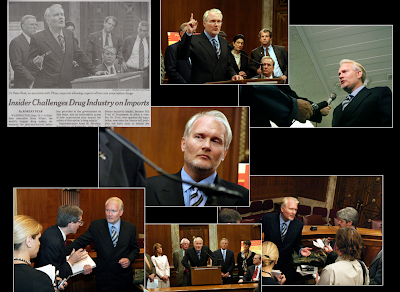
Dr. Rost on Leonard Lopate Show, New York Public Radio. Streaming audio here.
Dr. Rost on 60 Minutes, "Insider's Rx For Drug Costs." Streaming video here.
Dr. Rost on ABC/Safran download here.
Dr. Rost on Barry Gordon/From left field download here.
Dr. Rost on CNN:
Dr. Rost on FOX News:
Dr. Rost on Capitol Hill:
Dr. Rost and Maria Bartiromo:
PHARMACEUTICAL EXECUTIVE
DR. ROST TOPS GOOGLE SEARCHES FOR PHARMA LITIGATION
Search for pharmaceutical litigation consultant:

Search for pharmaceutical marketing witness:

Search for pharmaceutical marketing expert:

Search for pharmaceutical witness:

Search for pharmaceutical expert witness:


